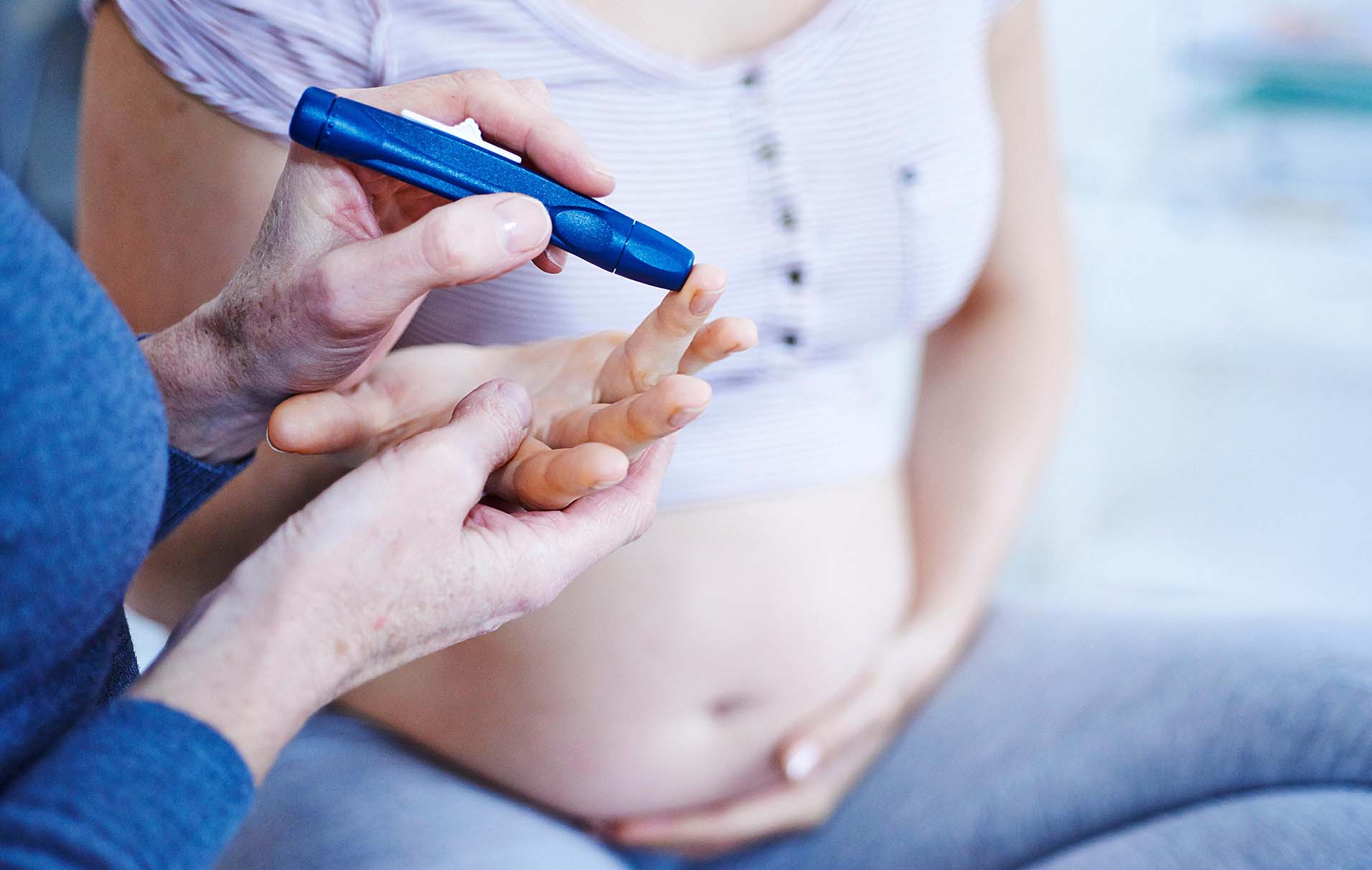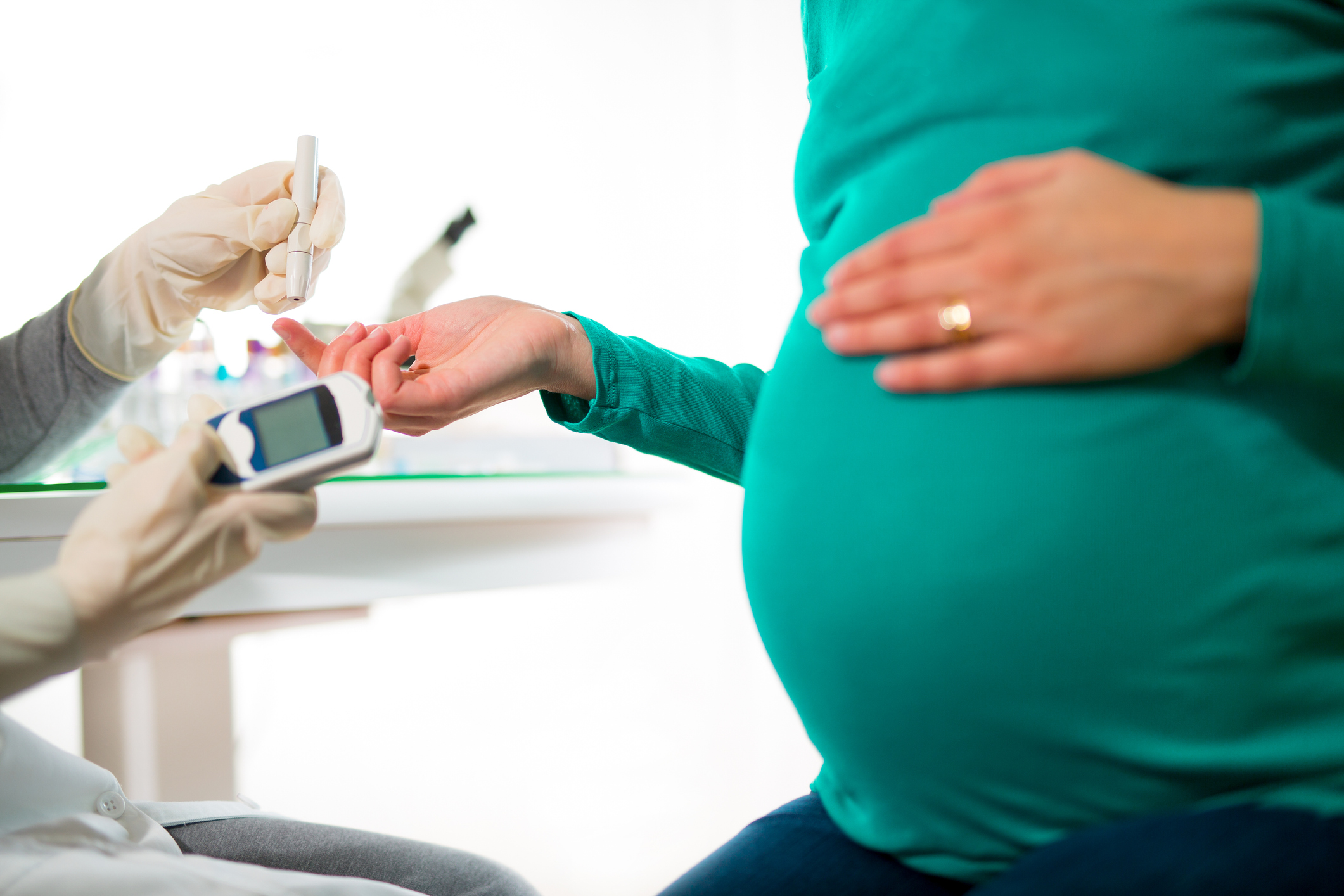Gestational diabetes in pregnancy: what does it mean for you and your baby?
Diabetes during pregnancy can cause complications, but it's easy to manage when you know how

Gestational diabetes is a condition that affects only pregnant woman, and it turns out, it could present some complications for you and your baby.
Diabetes UK estimates that roughly 16 out of every 100 women will develop gestational diabetes during their pregnancy, so if you experience it, you're certainly not alone.
What is gestational diabetes?
When you're not pregnant, a hormone called insulin breaks down the sugar in your blood so your body can use it as energy or store it.
When you're pregnant, your body has to produce extra insulin so your baby gets enough sugar (glucose). Gestational diabetes occurs when your body can't make enough insulin to deal with the sugar, so you have too much sugar in your blood.
MORE: Am I pregnant? Early signs and symptoms of pregnancy
Gestational diabetes is usually diagnosed at around 24 weeks when you'll be invited for a glucose tolerance test. It can occur at any time in the pregnancy, but typically happens later on, in the second or third trimester.
Women who are overweight or have a family history (amongst other factors) have a higher risk of gestational diabetes and will need to control their blood sugars with diet or medication, depending on the severity of their resistance to insulin.
GoodtoKnow Newsletter
Parenting advice, hot topics, best buys and family finance tips delivered straight to your inbox.
So what's the difference between gestational diabetes, and normal diabetes? Paul McArdle, a diabetes specialist and a registered dietitian, explained that, simply, "Gestational diabetes is defined as any diabetes that first appears in pregnancy.
"This could be pre-existing diabetes that has as yet been undiagnosed, but if it first appears in pregnancy it may still be labelled as ‘Gestational’ and is most common in the 3rd trimester of pregnancy."
What are the signs of gestational diabetes?
- More thirsty than usual
- Tired
- Need to go to the toilet frequently
- Blurred vision
But just because you have these signs, it doesn't automatically mean you have gestational diabetes as all these are also common pregnancy symptoms.
If you are considered to be at risk of gestational diabetes, are pregnant and have these symptoms, it's likely that you will be checked for the condition, according to Paul McArdle. He said, "About 4-5% of pregnant women will develop gestational diabetes ,and because it’s often hard to tell from symptoms alone, this test is really important so please take it up if offered.
"Speak to your GP or Midwife if you are unsure whether you’re ‘at risk’."
Plus, lots of women who have gestational diabetes will not experience any noticeable symptoms at all.
Can I be tested for gestational diabetes?

Some women are tested for gestational diabetes as part of their antenatal tests, but in some areas of the country you'll be only tested if you're showing symptoms - or if you're considered to be higher risk. Those who are deemed to be at high risk include those who:
- Are overweight (BMI over 30)
- Have a family history of gestational diabetes
- Have Polycystic ovary syndrome
- Have had a stillbirth previously
- Have given birth to a baby over 9lb 14oz
- Have had gestational diabetes before
The most basic test is a dipstick test which shows up sugar in your urine, but it's not thought to be very reliable.
However, there is also the more reliable oral glucose tolerance test (OGTT) which you have between 24 and 28 weeks. The test involves fasting for a period of time, drinking a glucose solution such as Lucozade, then having a blood and urine test after a certain amount of time to see how your body has dealt with the excess sugar.
What if I have gestational diabetes?
If you've been diagnosed with gestational diabetes, don't panic. You'll be referred to a specialist and you'll have more appointments at the hospital or with your GP so they can keep an eye on you.
Diet is especially important in controlling diabetes, so you'll be given advice on what to eat e.g limiting sugar. Exercise is also important - most pregnant women are recommended to aim for half-an-hour a day, if possible.
You may also have to monitor your blood sugar levels yourself and you'll be told what you should be aiming for. In some cases you might have to take medication to control your blood sugar levels, or inject insulin.
Is gestational diabetes dangerous for me?
Gestational diabetes can increase your risk of other pregnancy conditions such as:
- Pre-eclampsia
- Premature labour
- Too much amniotic fluid
Is gestational diabetes dangerous for the baby?
There are risks for your unborn child if you have gestational diabetes, which Paul explained, "can be challenging for expectant mothers, especially if they have a busy lifestyle and a family to look after."
If you have too much sugar in your blood, your baby may be getting too much sugar too, so it could grow very big. This could cause complications at birth and may increase the likelihood of a Caesarean section.
Untreated, gestational diabetes can lead to growth abnormalities in your unborn child and hyperhidrosis (excess fluid around the baby), although birth defects are not usually caused by GD, as it usually develops later in pregnancy.
It's also important to note that if the diabetes in noticed early and managed well, risks can be reduced.
Can gestational diabetes be prevented?
You can reduce the risk of getting it just by eating a balanced, healthy diet and doing regular exercise. Try not to have too many sugary drinks or snacks, even if you're craving them.
Diabetes UK also recommend maintaining a healthy weight before pregnancy, so if you're trying to get pregnant, being healthy and in shape beforehand could stand you in good stead.
Paul McArdle told GoodtoKnow, "Eating a healthy diet is key to managing gestational diabetes and avoiding obvious sources of sugar, such as sweets, cakes, chocolate and full-sugar soft drinks, is helpful to reduce refined sugars in the diet."
Using sweeteners can also be a helpful option when maintaining a healthy diet. Paul told us, "Choose fresh fruit and water or drinks with low calorie sweeteners as an alternative (but also limit caffeine as advised by your midwife or GP).
"Choosing foods and drinks with low calorie sweeteners offers people with gestational diabetes broader food choices by providing the pleasure of sweet taste without raising blood glucose."

However, it's also important to note that gestational diabetes cannot always be prevented.
Diabetes UK said, "There’s only so much you can do to reduce your risk of gestational diabetes – some women will develop it regardless of how healthy their lifestyle is."
Does gestational diabetes last forever?
Most women find that when they've given birth their blood sugar goes back to normal, but you'll be checked before you leave the hospital and offered subsequent check-ups until your GP's happy that you're not diabetic any more.
If I've had gestational diabetes once, will I get it again?
There's no guarantee that you'll get it again if you've already had it, although some women do get it more than once. It's best to keep a close eye on your blood sugar levels through subsequent pregnancies and you may be asked to do the OGTT test at 16 to 18 weeks.
Unfortunately, some studies, examined by Diabetes UK, have suggested that women who go through gestational diabetes are more likely to get type 2 diabetes later on in life. So it's vital to continue with your exercise and healthy eating even after giving birth.
What is pre-gestational diabetes?
Pre-gestational diabetes is defined as diabetes (Type 1 or Type 2), that you had before falling pregnant.
Women who are diagnosed with diabetes before they become pregnant will be managed in a slightly different way to straightforward GD patients.
MORE: The 9 daily habits you're doing that are putting you at risk of diabetes
Blood sugar levels will need to be monitored closely and medications adjusted accordingly - patients previously able to control their sugars with tablets, such as Metformin, may need to switch to injecting insulin to keep their blood sugars down, especially towards the end of the second trimester, when insulin resistance can increase.
Insulin-dependent patients may also need to increase their dose to accommodate the body's increased requirements.
Complications with pre-gestational diabetes are greater, with the development of the foetus's heart being of particular concern.
What to expect during your pregnancy if you have gestational diabetes or pre-gestational diabetes
You'll probably be asked to attend additional scans throughout your pregnancy, as well as an in-depth foetal cardiology scan which will be performed by a foetal cardiologist who will look in-depth at the ventricles of the baby's heart to make sure they're forming properly.
Although this may seem daunting, and it can be difficult at times, there are lots of minor changes which you can make to improve your blood sugar control.
It's likely that you'll be assigned a diabetic midwife and a consultant to monitor you, which usually means fortnightly appointments at your hospital or women's clinic. You may also see a dietician once or twice throughout the pregnancy who can give you useful tips about what you should be eating and when.
Following a low G.I. diet is the first step that you may need to take. All food is given a number between one and 100 to indicate how quickly the body processes the sugars it contains. High G.I. food, such as sweets, white bread, starchy food and sugary drinks, cause spikes in blood sugar and should be avoided. Low G.I. foods are broken down by the body over a longer period of time and release their sugars much more slowly, making them more suitable for a diabetic.
It's well worth investing in a pocket-sized book (they're easy to find online) with lists of Glycaemic Indexes in them, and you'll need to be aware that some foods may be surprisingly high on the G.I. - parsnips, for instance, score 97 out of 100! In time, you'll come to know which foods affect your blood sugars more than others, and also what alternatives there are out there.
Above all, try not to worry. As long as you listen to the advice of your healthcare professionals, eat sensibly and try to increase your exercise, diabetes during pregnancy can be well managed and does not mean complete avoidance of all the things that you like.
Guest post by Jayne Crammond of Mum's the Word.
Amy is Senior Digital Writer across Woman & Home, GoodTo and Woman, writing about everything from celebrity news to health, fashion and beauty features. When she isn't obsessing over the latest dress drop from Marks & Spencer, you'll most likely find Amy out running, or with a cup of tea in hand ready to dive into a gripping new Netflix series.